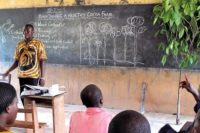Nestlé, the Ivory Coast’s government and the nonprofit Earthworm Foundation are partnering to protect the country’s Cavally Forest Reserve and its endangered species from deforestation.
Earthworm Foundation is working with Nestlé, the Ministry of Waters and Forests (Ministère des Eaux et Forêts or MINEF in French) and Ivory Coast’s forestry agency (SODEFOR) to protect and restore the Cavally Forest Reserve, one of the country’s most precious forests.
The Cavally Forest Reserve is one of 234 classified forests in Ivory Coast. Located in the Zagné area of the Cavally region – in the west of the country – it covers an area of 67,593 hectares and is home to endangered species such as chimpanzees, forest elephants and pygmy hippopotamuses.
In September last year, Nestlé announced its ambition to achieve zero net greenhouse gas emissions by 2050.
“When it comes to all the commitments being made by companies on climate, biodiversity and forests, the real challenge is to put words into action,” said Earthworm Foundation CEO Bastien Sachet. “We are happy that Nestlé is walking the talk with an ambitious plan to protect and regenerate this key forest landscape in Cavally.”
Darrell High, Nestlé’s cocoa plan manager, said the company is “delighted” to work with the government of Ivory Coast and the technical expertise of Earthworm Foundation.
“Our contribution to the restoration and reforestation of the Cavally Forest is part of our commitment to make sure that no cocoa we buy is linked to deforestation and our pledge to achieve zero net emissions by 2050,” High said. “We believe that a sustainable production of cocoa that benefits local communities and the environment, and spurs economic development, is possible. Collaboration with all key stakeholders will be key to achieve this vision, and this project is a first step in that direction.”
Over the next three years, Nestlé, the Ivory Coast government and Earthworm will implement a plan to protect the Cavally Forest Reserve, which will include forest restoration and supporting farmer livelihoods to be more resilient. They will work with farmers to understand how they can establish productive, well-run farms and identify suitable land and alternative livelihoods that protect and promote the interests of both the environment and the people who earn a living there.
Ivory Coast has lost forests rapidly over the last 60 years. In 1960, the country had 16 million hectares of forest, but that area shrunk to 3.5 million hectares by 2015. It is estimated that 60 percent of this forest loss has been caused by smallholder agriculture, a large part linked to cocoa production as forests create the essential climate needed to grow cocoa. This in a country with around a million cocoa farmers who rely on the crop for a living.
In 2014, the Ivorian government committed to turning 20 percent of its territory to forest by 2030. As part of this work, SODEFOR began a partnership with Starling (a satellite technology partnership between Earthworm Foundation and Airbus) to establish an accurate base map of the Cavally Forest Reserve.
“Using accurate satellite data allowed us to identify forest degradation at the earliest stages and better target our interventions, which is key when looking after such a big area,” said Mamadou Sangaré, SODEFOR’s Director General.
Since Starling data was used, deforestation in the reserve reduced by 83 percent.
“While we are excited about the increased efforts to protect and restore this critical forest, we realise that much more needs to be done,” said Gerome Tokpa, regional head of West Africa for Earthworm Foundation. “We see that precise spatial monitoring data – together with a trust and value-creation approach with surrounding farming communities – is the way to achieve effective forest protection and restoration. And we believe that this approach can be adapted and applied to other forest reserves beyond just the Cavally Forest Reserve.”
Engaging a broad range of stakeholders is equally important to forest regeneration.
“We look forward to engaging rubber companies and brands, cocoa traders and processors, and others who are directly or indirectly connected to this ecosystem through their supply chain to make a difference for Ivorian forests,” Earthworm Cocoa Lead Renzo Verne said. “Working with other groups will be important to achieving success – such as IDH (The Sustainable Trade Initiative), ICRAF (World Agroforestry), local organizations and institutions who are also active in the wider Cavally landscape and who share our vision of protecting this precious forest.”
Alain Richard Donwahi, Ivory Coast’s minister of water and forests, said the Ivorian government has adopted a national policy for the protection, rehabilitation and extension of forests.
“This partnership will strengthen our commitment to fight against deforestation caused in part by cocoa in Ivory Coast, strengthening the resilience of communities and cocoa producers,” Donwahi said. “I wish for success in its implementation.”




